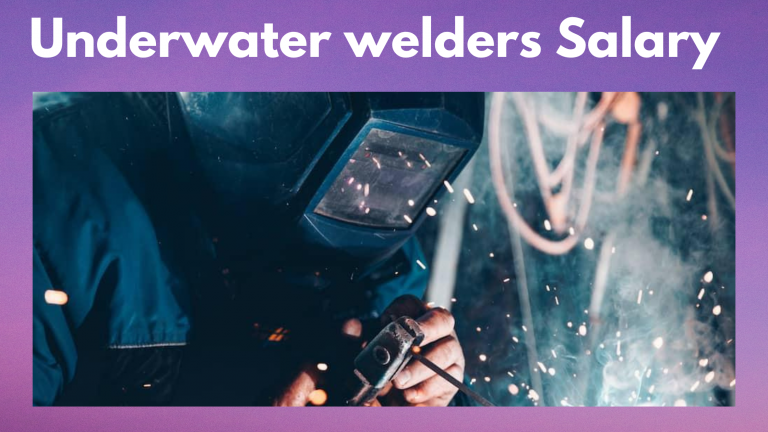Introduction:
Underwater welders, per the job title, perform welding operations underwater, but they actually do a lot more than that. Underwater welders are, by definition, a type of commercial diver, which is a specific certification beyond SCUBA. An Underwater welders Salary can expect to earn a salary that varies quite a lot depending on their employment situation and background.
Underwater welders Job Description:
Work below the surface of the water, using scuba gear to inspect, repair, remove or install equipment and structures. May use a variety of power and hand tools, such as drills, sledgehammers, torches, and welding equipment. May conduct tests or experiments, rig explosives, or photograph structures or marine life. Excludes “Fishers and Related Fishing Workers” (45-3011), “Athletes and Sports Competitors” (27-2021), and “Police and Sheriff’s Patrol Officers” (33-3051).
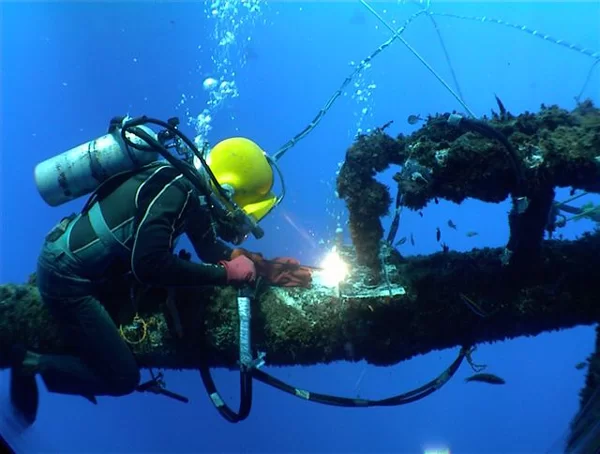
Average Underwater Welding Income in 2022:
According to commercial divers and global statistics, the average underwater welding salary is $53,990 annually and $25.96 per hour. However, most incomes float around $25,000 – $80,000. Diver welders in the top 10% make $83,730 while the bottom 10% pull in $30,700.
Based on our compensation data, the estimated salary potential for Underwater Welder will increase by 11 % over 5 years.
- Estimated Salary in 2027: $99,369 (USD)
- 5-Year Change: 11 %
Underwater welder Inland Income:
Among the ponds, rivers, and lakes of your area, you’ll bring home a paycheck of about $40,000 – $80,000. Most of your work will focus on dock areas, bridges, dams, and small vesselsInland welder divers don’t get the money of their offshore counterparts.
But they have the luxury of a less rigorous schedule (40-hour weeks) and less traveling. Unfortunately, when it comes to welding, freshwater makes for a more unstable environment due to the lack of salt ions.
Underwater welder Offshore Income:
Offshore underwater welders spend most of their time on oil rigs or large marine vessels like Navy ships. Their work schedule rarely lets up: It’s not uncommon to work 80 or more hours in a single week. However, due to their intense schedule, underwater welders will usually come back inland after a month out at sea.
Out in the ocean, Underwater welders Salary do a good deal of cleaning, pipe welding, and installation underneath major platforms. They must possess a good head for large machinery repair.
And if they have experience as a Diver Medical Technician – that’s a big bonus. Unlike inland diving, offshore welder divers must come in for the winter. Oceans are simply too perilous: Tidal waves, hurricanes, and the like.
How much does an Underwater Welder make?
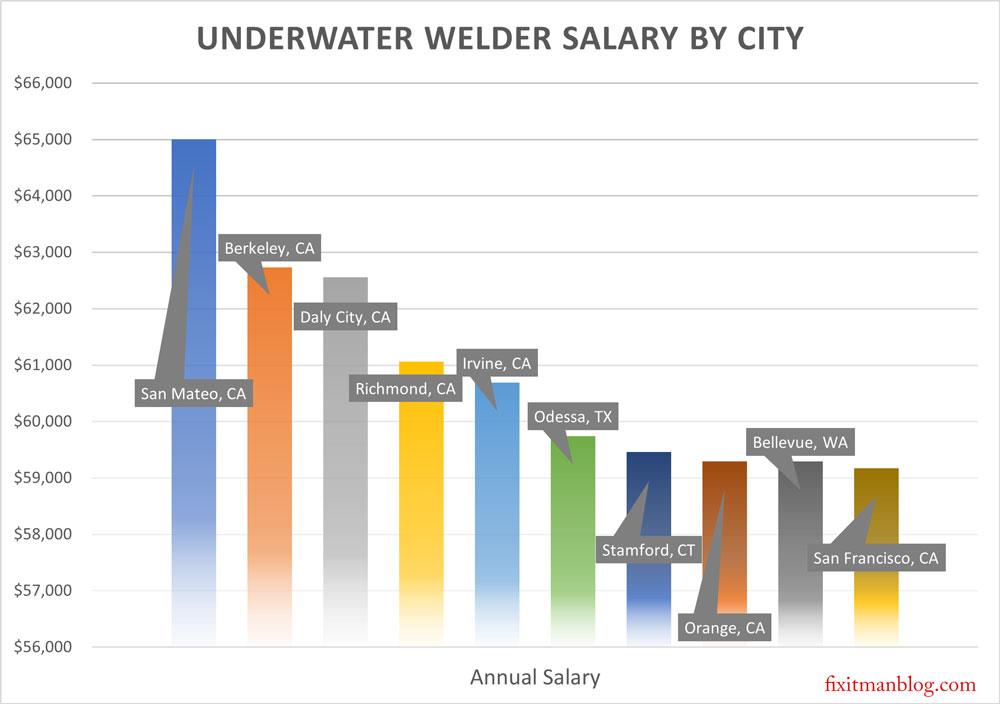
The average Underwater Welder in the US makes $42,035. The average bonus for an Underwater Welder is $1,982 which represents 5% of their salary, with 100% of people reporting that they receive a bonus each year. Underwater Welders make the most in San Francisco at $61,792, averaging total compensation 47% greater than the US average.
Underwater welder Education Requirements:
While underwater welding does not require a college degree, it does require multiple certifications generally obtained after going to a technical college or vocational school. These schools, in turn, typically require a high school diploma or equivalent to attend, say the experts at U. S. Bureau of Labor Statistics (BLS).
Common wisdom goes that it’s easier to teach a topside welder to swim than to teach a diver to weld. Accordingly, the chief certification to obtain, and the path most underwater welders start down, is a welding certification from Underwater welders Salary a professional body such as the American Welding Society.
You will also need a commercial diving certification, which is a specific, more advanced certification beyond SCUBA (self-contained underwater breathing apparatus) certification. Since many underwater welding positions take place in parts of the world outside the U.S. or in international waters, it’s best to get an internationally recognized certification Underwater welders Salary such as one from the Association of Diving Contractors International. It’s also a good idea to acquire some complementary skills like photography, drafting, and rigging.
Underwater welders Years of experience:
Salary increases are generally tied to your experience level. In general, the more years you spend working as an underwater welder, the more you can expect to earn. Here’s how experience can impact your underwater welder salary, according to the Bureau of Labor Statistics and the National Compensation Survey.
| Level of experience | Salary |
| Entry-level (less than 1 year) | $32,427 |
| Early career (1 to 4 years) | $37,658 |
| Mid-career (5 to 9 years) | $45,925 |
| Experienced (10 to 19 years) | $60,733 |
| Late career (20+ years) | $87,403 |
Types of Underwater welders and Pay:
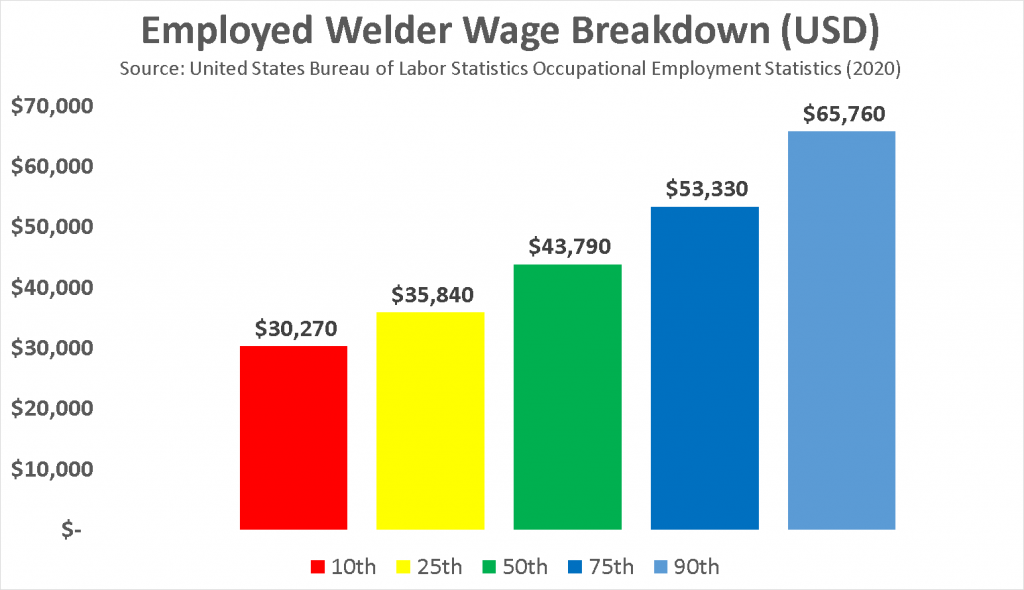
According to the experts at Water Welders, rookie onshore underwater welder salaries range from $25,000 to $40,000, and $50,000 to $80,000 after three to five years. Onshore underwater welders tend to have steadier employment and regular 40-hour workweeks throughout the year. They also tend to face less hazardous conditions, working on bridges, docks, water towers, and smaller vessels.
Offshore underwater welders typically work on larger vessels, underwater pipelines, and offshore oil platforms, doing everything from simple inspection and maintenance to heavy-duty underwater construction. They face more hazardous conditions, Underwater welders Salary as they are out in the ocean dealing with strong currents, poor visibility, and sometimes even marine wildlife. Rookie offshore underwater welder, underwater inspector, and underwater excavator salaries range from $40,000 to $60,000; more experienced workers in these roles can earn $75,000 to $100,000.
The final, specialized category of underwater welding is saturation diving. The Divers Institute of Technology explains this as descending deep under the sea for days or weeks at a time to avoid the delays and risks of depressurizing every day after a shift. This dangerous specialization commands a specific pay modification called “depth pay,” amounting to $1 to $4 dollars per foot of submersion. Underwater welders in this specialization typically earn over $100,000 per year, often hovering around $200,000 to $300,000 and going as high as $500,000 for the top-ranked specialists in the world.
Salary Ranges for Underwater Welders:
The salaries of Underwater Welders in the US range from $10,237 to $203,999, with a median salary of $37,028. The middle 57% of Underwater Welders make between $37,028 and $92,466, with the top 86% making $203,999.
Underwater Welding Career Earning Percentiles:
Here’s a breakdown of some of the latest underwater welder earnings in the US:
- $29,220 (Lower 10%)
- $45,890 (Median 50%)
- $84,370 (upper 90%)
The Bureau of Labor Statistics comes out with a report each year and provides these stats. Besides experience, underwater welders should be conscious of the other characteristics that increase their earnings.
How much tax will you have to pay as an Underwater Welder?
For an individual filer in this tax bracket, you would have an estimated average federal tax in 2018 of 22%. After a federal tax rate of 22% has been taken out, Underwater welders Salary could expect to have a take-home pay of $36,848/year, with each paycheck equaling approximately $1,535.
Why the Underwater Welder’s large pay range?
Most underwater welders receive pay by the hour or project. Here are the primary factors that affect your diving welder income:
- Experience
- Certification
- Environment
- Depth of Work
- Dive Methods
- Underwater Welding Equipment
- Distance Offshore
- Overtime
- Other Factors
Every factor is part of a larger equation for increased pay, marketability, and career opportunity.
How to increase your underwater welder salary:
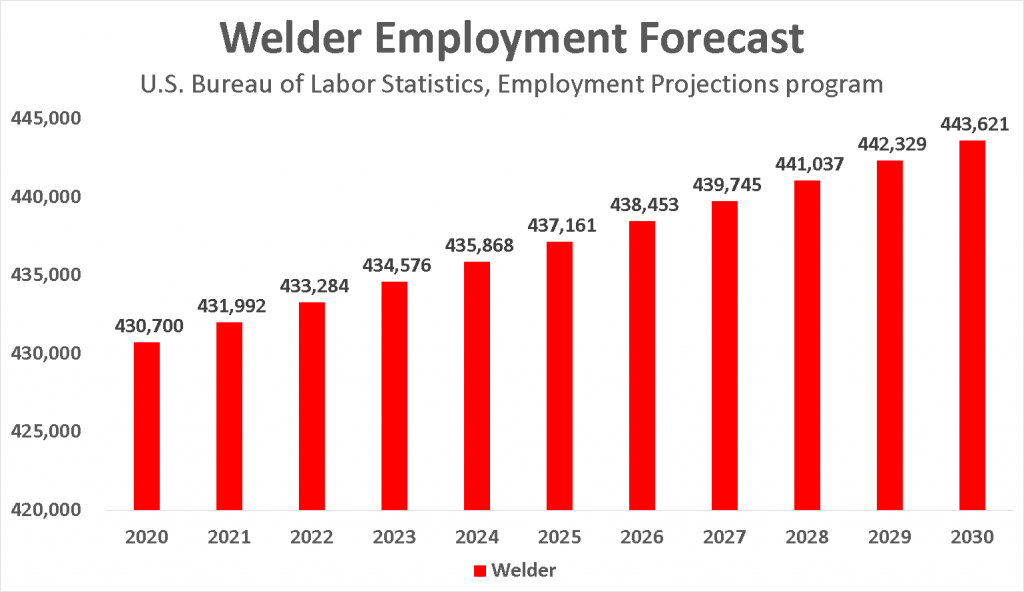
Now that you have a better idea of what you could expect to earn as an underwater welder, let’s look at ways to boost your salary.
Strengthen your skills:
Pursuing and improving in-demand skills could make you more competitive for promotions and higher-paying positions. These skills include:
- Welding: Join two pieces of metal together using heat and pressure
- Diving: Work underwater using breathing apparatus
- Inspection: Inspect welds for defects and ensure they meet quality standards
- Maintenance: Perform routine maintenance on welding equipment
- Repair: Repair damaged welds or underwater structures
Maintain a consistent performance:
As an underwater welder, your salary will be largely determined by your performance. Maintaining a consistent level of quality in your work will help you command a higher salary. Additionally, keeping up with the latest welding techniques and technologies will make you more marketable, and could lead to a salary increase.
Negotiate your job offer:
When you’re offered a job, be sure to negotiate your salary. Many employers are willing to pay more than they initially offer, and you could be missing out on extra income if you don’t try to negotiate.
FAQs about Underwater welder Salary:
Where do underwater welders make the most money?
In the ocean, you’ll earn $40,000 – $100,000 or more each year. Offshore underwater welders spend most of their time on oil rigs or large marine vessels like Navy ships.
What are the most an underwater welder can make?
According to commercial divers and global statistics, the average underwater welding salary is $53,990 annually and $25.96 per hour. Underwater welders Salary most incomes float around $25,000 – $80,000. Diver welders in the top 10% make $83,730 while the bottom 10% pull in $30,700.
How much does an underwater welder do?
As of Jul 28, 2022, the average annual pay for the Underwater welders Salary category in the United States is $55,879 year. Just in case you need a simple salary calculator, that works out to be approximately $26.86 an hour.
How long can underwater welders work?
They potentially work 10-12 hour shifts for up to 9 months at a time. However, offshore underwater welding is seasonal work since it is often too dangerous to work in winter conditions.
How deep can an underwater welder go?
The depth in underwater welding work can go as low as 30 to 400 feet of salinity water (FSW). Underwater welding works often are carried out for the repair of the Underwater welder’s Salary pipelines below drilling platforms, on some portion of the rigs, or on the platform structure itself.
What type of welder makes the most money?
Rig welders are about the highest-paid welders in the world. They work long and difficult hours and they have the most advanced education and qualifications. Underwater welder’s Salary If they make a mistake, it’s going to be cataclysmic, so companies only hire the best of the best for these positions.
How hard is underwater welding?
Underwater welding requires a great amount of skill, as it is a very physically demanding job with a high degree of technical complexity. As such, the Underwater welder’s Salary industry will continue to demand higher quality standards for underwater welds and more certification of underwater welding systems and personnel.
Where do underwater welders work?
Underwater welders work in remote and dangerous locations, such as offshore oil rigs and pipelines.
Conclusion:
Underwater welder’s Salary can be broadly split into dry and wet welding techniques. Dry welding, which uses a hyperbaric chamber to create a dry environment around the weld area for the welder to work in, offers better results than wet welding, which uses the bubbles created by the shielding gas to cover the weld area.
Underwater welding is a lucrative and necessary, yet dangerous profession. The techniques used for underwater welding are used for the repair of marine structures and assets including offshore pipelines, oil rigs, and ships. Underwater welders also work in places such as nuclear power plants.

